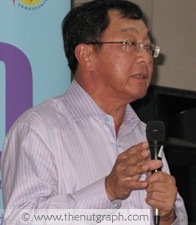
WORSE than Malaysia’s brain drain problem is the fact that little is coming in to replace what goes out. Losing skilled local talent to other countries is not unique to Malaysia, as statistics show. After all, the world was built on migration.
But what is unique, and not in a good way, is that we can’t seem to attract enough foreign skilled labour to equalise the outflow. “We’re a failed brain transplant,” said Dr Toh Kin Woon, a former Gerakan and Penang state exco member, at a 13 July 2010 public forum in Kuala Lumpur on Malaysia’s brain drain.
Part of this lack of inflow can be attributed to immigration rules that make it difficult and arbitrary for foreign spouses of Malaysians, and the children of such unions, to obtain permanent residency (PR), citizenship and employment. And yet, adjusting these rules would be the most sensible and practical immediate solution to the brain drain problem. So why aren’t we doing it?
Malaysians abroad
Malaysians have long been going abroad ever since independence for tertiary education in Commonwealth countries. Between 1960 and 2005, a hundred-fold increase was recorded in emigration numbers. There were 9,576 Malaysians residing abroad in 1960. In 2005, the number rose to 1,489,168, according to World Bank statistics, said former Human Resources Minister Tan Sri Dr Fong Chan Onn, who was also a presenter at the public forum.
The figure in 2005, however, shows how alarming the outflow of human capital for Malaysia is when compared with the 919,302 world average migration per nation. Malaysia is losing people at a higher rate than other nations.
A high percentage of this outflow is skilled labour. Fong said there were 102,321 Malaysian graduates residing in Organisation for Economic Cooperation and Development (OECD) countries in 2000. This represented 77.24% of total Malaysian migrants in these countries. They also represent a 40.84% increase from the number of tertiary-educated migrants since 1990.

We could comfort ourselves that Malaysia is not alone in losing skilled talent to other countries. Fong said data from OECD countries in 2000 showed that Singapore had 67,560 migrants in these countries, of whom 74.04% were graduates. Of Thailand’s 222,550 migrants, 41.7% were tertiary-educated. South Korea lost 885,885 people, of whom 73.7% were graduates; and India had 1.5 million of its citizens abroad, of whom 69% had degrees.
And Malaysia isn’t the only one losing doctors, nurses and other medical personnel to other countries. There were 4,129 Malaysian doctors and 7,431 nurses in OECD countries in 2000. Other Asian neighbours with higher figures in the same year were Taiwan (5,332 doctors) and the Philippines (15,859 doctors and 110,557 nurses).
The reasons why Malaysians leave are varied, and have been discussed repeatedly in various other forums. But it is of little comfort when we realise that while our neighbours are able to draw an inflow of skilled talent through immigration-friendly policies, attractive rewards and open environments, Malaysia is only able to draw low-skilled foreign labour. There are an estimated 2.5 million foreign workers in the country, both legal and illegal, all largely holding menial jobs in agriculture, manufacturing, construction and low-paying service sectors.
In contrast, the New Economic Model report has noted that the number of expatriates from first-world countries, which was 90,000 in 2000, was halved by 2008.
If government reverse-brain drain programmes have only had minimal success, then it is time that due consideration be given to other approaches. For a start, as suggested by Fong at the forum, by relaxing immigration and employment rules for foreign spouses and children.

Runaround
What turns highly-trained Malaysians and their highly-skilled foreign spouses away?
For one, the foreign spouse, whether the husband or wife, is not entitled to immediate Malaysian citizenship or PR status despite adopting Malaysia as their new home. Instead, they have to go through a repeated and tiresome application process, which involves the runaround with immigration authorities, endless waiting, and unexplained rejections. Their existence in the country, meanwhile, is validated by a renewable social visit pass that restricts their employment.
Children of a Malaysian woman married to a foreign husband also do not qualify for PR status or citizenship, until recently when the government announced a “new mechanism” to let such mothers obtain Malaysian citizenship for their children abroad. How well this is working out is unclear given that it was just announced. There is also the inconvenience of having to travel back to Malaysia to appear in person at the National Registration Department headquarters with the baby.
Foreign spouses have documented their difficulty and emotional trauma of being left in limbo over their PR applications, much less citizenship. These stories are many, and some end with Malaysians making the painful decision to uproot to settle in their foreign spouse’s country.
Cold War mentality
At the public forum, even Fong himself, a former cabinet minister, seemed bewildered as to why Malaysian immigration policies remain the way it is in this day and age. He described such policies as “Cold War mentality”.
To be less polite, the policies are actually xenophobic. For lack of any rational explanation from the government, people are left to conclude that at worst, the snail’s pace of processing applications is part of moves to ensure a certain racial balance in the country. At best, it is just plain inefficiency if foreign spouses have had to wait for up to two decades or more.

If Malaysia weren’t so xenophobic, imagine the talent we could have possibly laid claim to. Could former world number-one golfer Vijay Singh, a Fijian married to a Malaysian, be playing as a Malaysian instead? What other talents among the nearly 1.5 million Malaysians who have migrated, and their spouses, have we let slip through our fingers?
In his last interview on the subject in September 2009, Home Minister Datuk Seri Hishammuddin Hussein offered little new insight into reasons for the lengthy and arbitrary process of approving PR and citizenship applications. But he did understandably say that vetting thousands of such applications to ensure they were bona fide cases and not “marriages of convenience” was a time-consuming and difficult process.
Fair enough. But when it comes to highly-qualified and skilled human capital, it doesn’t make sense that the government would still be as finicky and slow. If a foreign spouse has all the right academic and professional qualifications to contribute to Malaysia, why can’t PR or citizenship approvals be sped up for them? Isn’t it obvious to the policymakers that spouses with such experience and potential can be part of the solution to Malaysia’s brain drain?
The government was certainly clear on Indonesian badminton champion Rexy Mainaki‘s contribution to Malaysia, when he coached the national doubles team, that it gave him and his family Malaysian PR status.
Why can’t there be ways, then, to filter foreigners who are in marriages of convenience from those who can contribute to the skilled labour pool in Malaysia? For one, it is obvious that foreign spouses who are highly qualified and who have an established professional track record would not need to be so economically needy as to require the “convenience” of a Malaysian spouse to live here.
Throughout history, immigrants who have made good in places where they were given the opportunity to do so not only became giants in their fields of expertise, but added to the lustre of the countries and institutions they joined. Albert Einstein, a German Jew, migrated to the US to escape Nazism and joined Princeton University. He died a US citizen. Julia Gillard was born Welsh and migrated to Australia as a child, where she is currently the prime minister.
So really, the government should realise that simply clearing the backlog of citizenship and PR applications isn’t cause for applause. It simply was a job they failed to do earlier. And having done so isn’t enough. What’s needed is a reformed and unbiased way of approaching the issue of foreign spouses. Especially if the national issue at stake is to stem the bleeding of human capital. ![]()
Deborah Loh wonders when the government will appreciate the diversity of Malaysians, their spouses, and what they can contribute to the country.
[related-posts]


orangasle says
My wife is an Indian Citizen, we have two kids. She is an architect was employed in reputable architectural firm here. We went through all of the above obstacles.
Today she is back in India for two reasons (while I’m still here) 🙁
#1. Despite having two children with Malaysian citizenship and being married to me for what will be 10 years this December, SHE WAS UNABLE TO SIT FOR A “PAM” EXAM because she doesn’t have a PR. Therefore blocking her progress in her career. After 2 months of leaving, her company offered her 8k to come back… she choose not too.
#2. Children’s Education (Primary & Secondary) lacks quality in delivery and in curriculum.
Reza says
Racial politics is definitely a major factor. Instead of giving citizenship to well-educated foreign non-Malays, citizenship is instead given to the likes of low-skilled Indonesian labourers to bolster the Malay majority. How to become a high-income nation when the government is wallowing in its siege mentality?
dee says
Next, their second generation gets Bumi status which exceed the rights of indigenous people!
julian says
Thanks for covering this issue.
Regarding children of Malaysian women, I think that it only applies to women who are outside of Malaysia. Children born to Malaysian women within Malaysia can be registered as Malaysian citizens easily.
An additional restriction of the ‘spouse visa’ is that the foreign spouse cannot be a student.
Ida Bakar says
Never underestimate the rise of the current Malaysian-style Islamisation on the brain-drain.
In Malaysia, a Muslim can only be married to a Muslim (even though the Quran says otherwise). There is no provision for civil marriage between a Muslim and a non-Muslim in Malaysia. Therefore, a civil union formed in a foreign country is illegal in Malaysia.
Furthermore, the rise in moral policing and the arbitrary application of syariah law have scared off many foreign spouses – and Malaysians – who are used to the liberal atmosphere where the relationship initially flourished.
@Reza: The effect of the racial politics is probably lost on a two people I know, both highly skilled, both Malay-Malaysian females. The first case: She married a British Muslim and both are qualified doctors. He couldn’t get a job in Malaysia and now both are in Scotland, employed in their chosen field.
The second case: A highly trained academic who married British Muslim and they have two daughters. The prospect of her daughters being denied citizenship and her husband having to renew his ‘visa’ repeatedly are factors in her deciding whether or not to return.
C-K Ng says
I am surprised that Deborah Loh happily made the xenophobic call (which I highly doubt) but failed to nail the real issues at hand – blatant sexism (as outlined in the Constitution), and blatant racism as the commentor Reza had mentioned.
The article would be better if the writer would look into the dynamics of migration and the labor market or demands in Malaysia. Focussing on the medical field tends to bias the reader to think that Malaysia needs more doctors or nurses or in general medics. The need for more GPs and generalist nurses in Malaysia may be true at the macro level. However, one must ask the question who are these doctors who had left? And why? And do their skillsets match the medical and health care delivery needs of a country like Malaysia. To presuppose that any doctor, especially those trained in niche fields of expertise will find gainful employment in Malaysia is foolhardy. Likewise thousands of engineers, Ph.D. level scientists and humanities experts have decided to make a career in OECD countries simply because their newly trained field of expertiese demand them to be in those countries where the cutting edge research is done at the most competitive level.
Malaysia does lose its talented population, and so long as we are a modern forward looking nation that trades openly with the world, we must let these people go. We must encourage the talented design artist to set up shop in NYC, Tokyo, Beijing or Cape Town. And likewise, the budding nuclear physicist to earn her post-doc stint in CERN. And the newly minted psychoneurobiologist to spend time at the NIH, USA. Let them build a career in these OECD countries and let them bloom.
Over the long haul, if Malaysia continues to develop its economic and scientific base, we will likely tap onto this network of highly trained and highly skilled/knowledgeable expartriates. The question is what do we do to ensure these emigrated Malaysians are “in the loop”?
Is there a Contact Singapore version for Malaysia? If not, why not?
Megabigblur says
My husband is American. We’re both scientists with Master’s degrees. I’ve made it clear to him that I want to settle in Malaysia eventually, but given the hassle of getting PR I don’t know what we’re going to do for him.
Sean says
I make two day-trips a year to the Seremban Imigresen office with my Malaysian wife to watch her haggle up the 6 month offer to 12 months pasar-malam-style, when my wife applies for multi-year ‘Leave To Remain’ by post in the UK. I don’t have the option of seeking employment as a local would – as my wife can in the UK. I can’t vote, but my wife can when we live in the UK. All of those things are fairly well down my list of reasons why I wouldn’t unreservedly contribute to Malaysia. If some of the other stuff could be sorted out, I would happily renew my visa weekly by bare-knuckle coffee-boy wrestling in a giant vat of KY at the local prison and carry my visa around carved into a giant concrete crucifix.
Maybe other foreign spouses have different priorities? Perhaps you should start a ‘Foreign Spouse Watch’ survey. On second thoughts, I complain so much already I even bore myself.
dee says
Looks like my husband-to-be and I are heading down that path soon… *sigh*…
dydy says
I am a Malaysian women married to an Indian man. We are Muslim and his family has been staying in Malaysia for 20 years. They all are still Indian citizens and recently only his parent got PR status after 20 years of application. All the children are still Indian citizens. They contribute so much to Malaysia academically/economically but still nothing Malaysia did for them. The PR only after 20 years running up and down of Immigration and KDN office but too late for the kids to get the PR coz everybody has reached more than 18 years of age.
My uncle married an American woman and had to move to America coz he hated the system after 3 years. Now he is a well-paid software engineer in America with 4 daughters and a wife. He said Malaysia will not accept him as a Malay married to a foreign spouse. I truly understand him as we are in the same situation.
Difficulties for my highly-skilled husband to find job here is not a new problem. A masters degree and experience do not guarantee that the tonne of applications we send everywhere will be answered. We are still looking for a job and have already reached our patience limit. Most companies do not want to hire foreigners coz they don’t want any headache with immigration papers. We will probably move outside Malaysia which will enable us to find jobs without the need to think about the discrimination created by our own authorities.
No wonder Malaysia lost geniuses which can contribute to the economy. I don’t think they will change it or make the process easier.